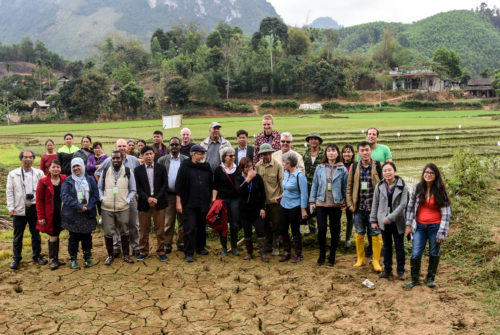| Thursday, 2 Aug | ||
| 7:00 pm | to | 9:00 pm |
Dr. Annette Cowie, Principal Research Scientist and Dr. de la Rosa will discuss their biochar project at the next Sustainable Living Armidale monthly forum on Thursday, 2 August, at 7pm, Kent House
 Land degradation affects 24% of global land area, with 24 billion tons of fertile soil lost annually. The causes of land degradation include unsustainable farming practices, deforestation, overgrazing, expansion of urban areas into farmlands, mining and climate change. It exacerbates rural poverty, threatens food security, reduces biodiversity, and leads to migration and resource wars. Maintaining soil fertility is fundamental for improving food security, reducing poverty and preventing conflict. Biochar (charcoal used as soil amendment) offers potential in addressing these issues.
Land degradation affects 24% of global land area, with 24 billion tons of fertile soil lost annually. The causes of land degradation include unsustainable farming practices, deforestation, overgrazing, expansion of urban areas into farmlands, mining and climate change. It exacerbates rural poverty, threatens food security, reduces biodiversity, and leads to migration and resource wars. Maintaining soil fertility is fundamental for improving food security, reducing poverty and preventing conflict. Biochar (charcoal used as soil amendment) offers potential in addressing these issues.
The benefits of biochar systems include enhanced crop production, waterways protection, soil remediation, carbon sequestration, improved nutrient and water retention, greenhouse gas (GHG) mitigation, use of co-products in renewable energy generation, waste and resource recovery, and sustainable land management. The Biochar for Sustainable Soils (B4SS) project is funded by the Global Environment Facility and UN Environment, and coordinated by Australian NGO Starfish Initiatives (based in Armidale). It supports organizations in China, Ethiopia, Indonesia, Kenya, Peru and Vietnam to evaluate the effects of appropriate biochar formulations under various environments.
Biochar must be produced from biomass residues and needs to be complemented with nutrients and minerals. The B4SS is leveraging locally available agricultural waste, such as coffee husk and cattle bones in Ethiopia; chicken manure that a farm cannot recycle and green waste diverted from landfill in Peru; sugarcane bagasse in Kenya; crop straw diverted from open burning in Vietnam and China; and unused cacao shells and cassava stems in Indonesia. Recovering these residues for biochar application has contributed to an efficient capture of nutrients, improved waste management and reduction of GHG emissions. Carbon that would have been emitted to the atmosphere has been sequestered in the soil in the form of biochar. In all countries, crop yields have increased and/or fertiliser use has decreased. For example, in Ethiopia, biochar from coffee husk co-composted with animal manure has resulted in savings of about 40% NPK fertiliser. Biochar has more significant benefits when applied to soils with low fertility and is more profitable when used to grow high-value crops. There is potential for scaling up to other regions affected by similar conditions. See www.biochar.international.
The forum will start at 7pm at Kent House on Thursday 2 August. All are welcome to attend – gold coin donation appreciated.


